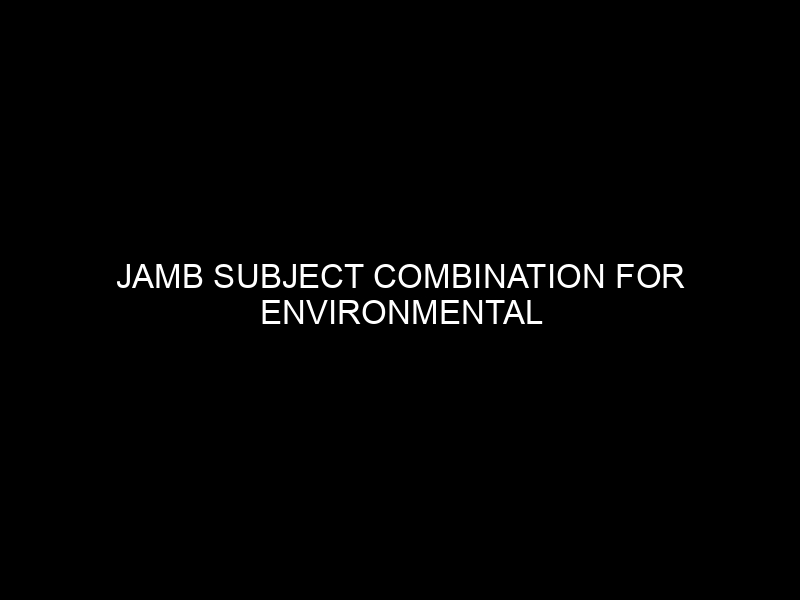Environmental Education in the 21st century has become a cornerstone of sustainable development, fostering an understanding of how ecosystems work and how human activities impact them. As environmental challenges become more prominent, the need for comprehensive education in this field is paramount. The Joint Admissions and Matriculation Board (JAMB) in Nigeria plays a crucial role in facilitating access to higher education, including courses in Environmental Education. In this article, we will explore the JAMB subject combination required for Environmental Education for the academic years 2024/2025, ensuring prospective students are well-prepared for their university entrance examinations.
Environmental Education, as a course in Nigerian universities, combines elements of science, policy, and community engagement to educate the next generation of environmental stewards. The JAMB subject combination for this course is thoughtfully designed to reflect the interdisciplinary nature of the field.
Detailed Insights into the JAMB Subject Combination
Core Subjects for Environmental Education
The JAMB examination for Environmental Education typically requires a combination of subjects that lays a foundation in both science and social understanding. The core subjects usually include:
- Biology: This is a pivotal subject as it provides knowledge about living organisms and ecosystems, which is fundamental for environmental studies.
- Geography: This subject offers insights into physical landscapes, human-environment interactions, and environmental management.
- Chemistry: Understanding chemical processes is crucial in studying environmental pollution and solutions.
Optional Subjects
In addition to the core subjects, students may choose an optional subject to complete their combination, such as:
- Physics: Helpful for understanding energy dynamics and environmental technologies.
- Economics: Offers a perspective on environmental policies and sustainable development.
- Agricultural Science: Important for studying sustainable agriculture and its environmental impacts.
Importance of Selecting the Right Subject Combination
Choosing the right subject combination in JAMB is critical for students aspiring to study Environmental Education. This combination not only determines their eligibility for their desired course but also lays the groundwork for their future studies. It’s essential that students consult with educational advisors or do thorough research to ensure they meet the specific requirements of their chosen universities.
How to Prepare for JAMB Subjects in Environmental Education
Preparation for JAMB requires a strategic approach, particularly for a specialized field like Environmental Education. Here are some tips:
- Understand the Syllabus: Familiarize yourself with the JAMB syllabus for each subject to understand the scope of the examination.
- Use Past Question Papers: Practice with past JAMB questions to get a feel of the examination pattern and question types.
- Time Management: Develop good time management skills to effectively allocate time to each subject during preparation and in the examination.
FAQs About JAMB Subject Combination for Environmental Education
Q1: Can I choose Mathematics instead of Biology for Environmental Education?
A1: While Mathematics is important, Biology is typically a mandatory subject for Environmental Education as it directly relates to understanding living ecosystems.
Q2: Is Environmental Education a good career choice?
A2: Absolutely. With growing environmental challenges, there is a high demand for professionals equipped with knowledge in this field.
Q3: Can I switch to Environmental Education in university if I didn’t take the required subjects in JAMB?
A3: This might be challenging as most universities strictly adhere to the JAMB subject combination criteria. However, consult with the admissions office of the respective university for guidance.
Q4: Are there any specific textbooks recommended for JAMB preparation in these subjects?
A4: JAMB often provides a list of recommended textbooks. Additionally, consult with teachers or educational advisors for specific recommendations.
Q5: How important is Geography in studying Environmental Education?
A5: Geography is crucial as it provides an understanding of spatial aspects of environmental issues, which is integral to the field.
Conclusion
The JAMB subject combination for Environmental Education is an essential step for students aiming to pursue a career in this vital field. It requires careful selection of subjects that will form the foundation of their higher education. Students must engage in diligent preparation, leveraging resources like past papers and textbooks, and seek guidance from educational experts. With the right preparation and mindset, students can excel in their JAMB examinations and embark on a rewarding journey in Environmental Education.

